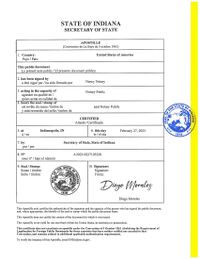Apostille

An Apostille is a way for foreign governments to validate that an official document you have was actually granted by the document granter's home government or institution. It's a form that is filled in by that document's home government, and it contains a standard set of information which helps other governments accept and understand each other's official documents.
Some governments may require a Translation of your documents once they are aspostilled.
Who Grants Apostilles?
All apostilles are issued by their corresponding government of origin. So if, for example, you were born in Hoboken, NJ but married in Albany, NY, then your birth certificate would be apostilled by the New Jersey Department of Revenue and your marriage certificate would be apostilled by the York Department of State.
University diplomas or certified transcripts are generally apostilled by the state government the institution is located in, though some universities offer apostilled copies directly.
The state department has a list of which authorities can apostille which documents (archived here). Generally, documents signed by U.S. federal officials, U.S. consular officers, Foreign consuls registered with the U.S. Department of State’s Office of Protocol and Military notaries or judge advocates need to be apostilled by the state department.
If your document is signed by state officials or other sources, this list can help finding the correct authorities to get an apostille from.
Requirements for Apostilles
We are receiving reports that some countries require the apostilled documents be less than 6 months old at time of arrival. We will continue to investigate if this is the case and update here.
In general, foreign governments do not require that certified diplomas/transcripts to be separately notarized before being apostilled but some states require the records to be notarized in order to be apostilled.
There are a handful of countries that do not accept apostilles and use alternative authentication mechanisms, a list of those is available here.
How to Request Apostilles
Some jurisdictions will allow you to get apostilles when you request certified copies of your vital records.
Some jurisdictions will offer walk in service for apostilles. This may be a good option if you live near the capital or a major city in the state that issued the original document, but not all states will allow this.
The most common way to get Apostilles is via mail or via a third party expediter who can show up in person for you.
What is a Hague Apostille?
Many countries are party to the 1961 Hague Apostille Convention, which was an attempt to create a simplified system for notarizing documents for use abroad. Any Hague Apostille country will request any document issued by a foreign government - if the document is used within that country - to have an apostille included with it. While visa applications made within the US do not always require an apostilled document, many others do. And applications made within Hague Convention countries, such as for residency, will often require an apostille. An apostille is valid for any country that is a signatory to The Hague Convention on Apostilles. An authentication, which is used by countries that are not signatories to this convention, is not valid for any country but the target country. Applications for apostilles and authentication will generally ask for the name of the target country for this reason (so documents can be properly certified for non-apostille countries).
Currently, 127 countries are members of the Hague Convention. Countries which are not Hague Convention members, which primarily are located in Africa, the Middle East, Southeast Asia, as well as the Carribean, will require authentication and legalization.